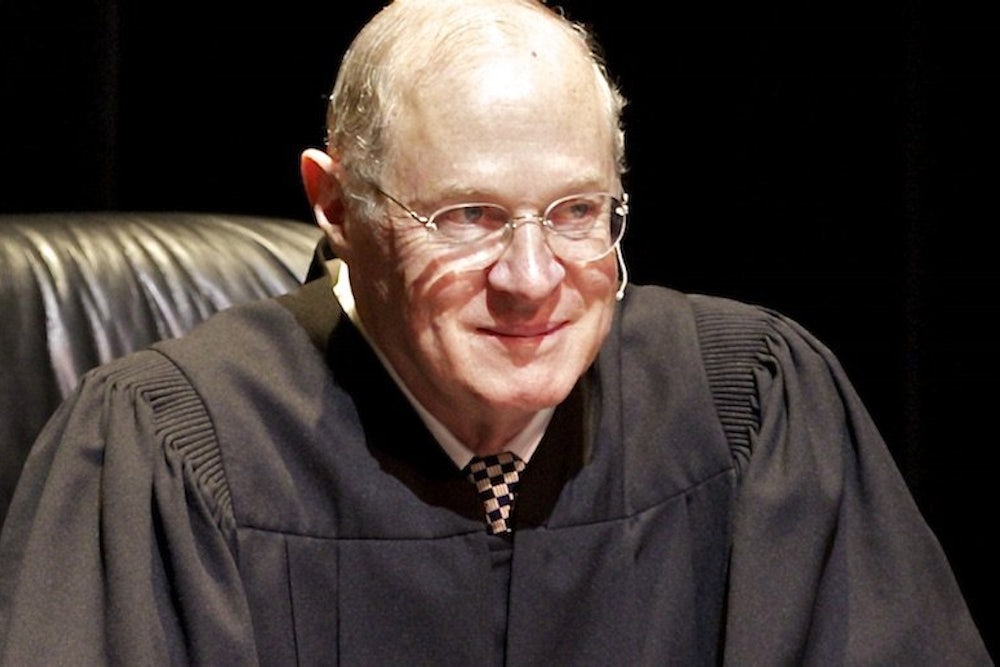There was little mystery about who would be writing today's SCOTUS decision on marriage: As he's done for almost all decisions involving LGBT rights during his tenure, Justice Anthony Kennedy once again took up his pen to write the majority opinion in a 5-4 ruling that went as far as the court possibly could in defending the rights of same-sex couples.
“No union is more profound than marriage, for it embodies the highest ideals of love, fidelity, devotion, sacrifice, and family,” Kennedy writes in the closing paragraph of the court's opinion. “As some of the petitioners in these cases demonstrate, marriage embodies a love that may endure even past death. It would misunderstand these men and women to say they disrespect the idea of marriage. Their plea is that they do respect it, respect it so deeply that they seek to find its fulfillment for themselves. Their hope is not to be condemned to live in loneliness, excluded from one of civilization’s oldest institutions. They ask for equal dignity in the eyes of the law. The Constitution grants them that right.”
Make no mistake, this is Kennedy's decision. While he chose, in 2013's United States v. Windsor, to argue against DOMA on federalism grounds, it was his language regarding the dignity of same-sex couples and the potential harm inflicted on the children of these couples that led judges across the country to strike down gay-marriage bans, arguing that the Windsor ruling effectively made these bans unconstitutional. The domino effect continued until only 14 states remained without equal marriage rights. Public opinion shifted swiftly from a minority position to 60 percent or more now in favor in most polls. The court rarely wants to get ahead of public opinion. Still, it's hard not to interpret Kennedy's language in the earlier Windsor ruling as deliberate, designed to influence lower courts toward rulings which would create the environment where SCOTUS could comfortably rule in favor of marriage without seeming to be ahead of the curve.
Following Thursday's rulings on Obamacare and housing discrimination, this decision seems to confirm a leftward tilt in the Roberts Court that is leaving conservatives fuming and full of conspiracy theories. But if those decisions came as somewhat of a surprise, this one seems to have been foreshadowed since October, when the Court refused to hear appeals arguments by five states where same-sex marriage was allowed. It was unlikely that the court would effectively allow marriage in those states (and by default several others), only to later strike down marriage on the federal level.
The Court consolidated four separate cases to consider its ruling, but most of the attention has focused on the title case, Obergefell v. Hodges, in which Jim Obergefell wanted the death certificate of his husband, John Arthur, to reflect that Obergefell was the surviving spouse, something which was still not legally required under Ohio law.
Partners for more than twenty years, Obergefell and Arthur had flown to Maryland to get married once they found out that Arthur, long suffering from ALS, had only a few months left to live. Family members and friends donated the $13,000 to pay for the medical flight to have the ceremony performed in a state where marriage is legal. These kinds of burdensome trips will soon no longer be necessary—which doesn't mean conservatives have necessarily given up on the issue completely. On Thursday, Texas AG Ken Paxton told county clerks in his state to wait for “direction and clarity” from his office before issuing any same-sex marriage licenses. We have seen this before, notably in Alabama a few months ago, and will likely see it in Louisiana soon as well, as Governor Bobby Jindal, a presidential candidate, tries to bolster his conservative cred among Evangelicals.
Still, reaction among mainstream Republicans has been mostly muted so far. Most presidential hopefuls and governors have issued standard-issue remarks about how they support "traditional marriage." Scott Walker and Mike Huckabee will try, and fail, to goad the others into calls for a constitutional amendment and promises to protect religious liberty, i.e., the right of “dissenting” people of faith to deny services to same-sex couples. But all in all, I'm sure the Republicans will be glad that SCOTUS has taken them off the hook on this issue, much as the court has done in its health care ruling. Outside of select Republican primaries, rallying against same-sex marriage doesn't win you votes any more.
But the seeming inevitability of this ruling doesn't make it any less historic. Next weekend in Philadelphia, the LGBT rights movement will celebrate the 50th anniversary of the “Annual Reminder” marches for equality that began in that city in 1965, at the time the largest demonstrations for gay and lesbian equality in the world, preceding the Stonewall Riots by four years. Fifty years doesn't seem like a long time, cosmically speaking, but it's an important reminder, whenever people speak about the “lightning speed” at which gays and lesbians have been securing rights in the U.S., that the movement didn't begin a few years ago. That the 1980s and '90s brought an AIDS epidemic that ravaged the community and was largely ignored by the federal government. That in 2004, dozens of states passed same-sex marriage bans. Since then, the LGBT community gathered and regrouped, after tragedy and setback, and continued to push for its rights and dignity. The eloquence of Kennedy's final paragraph shows that these struggles were not in vain.
